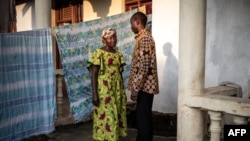Arlette Kavugho was released from an Ebola treatment center in eastern Congo in March, but her problems did not go away.
The mother of six children tried to return to work in her hometown of Butembo. Kavugho has a job as a seamstress. She makes clothing for other people.
But after returning to work, her customers were afraid they would get Ebola from her. Her doctors declared that she was no longer infectious, but the customers stayed away.
So Kavugho found work caring for children suspected of having the disease. Then other people accused her of falsely claiming to be sick to get the job.
To this day, Kavugho has not been able to find the place where her 19-year-old daughter and two-month-old granddaughter were buried. They both died of Ebola while she was receiving treatment.
“I try to find the dates on the crosses…but I always come back empty-handed,” the 40-year old said. As Kavugho spoke, she held a picture of her daughter with a handwritten note saying “adieu,” the French word for “goodbye.”
As of October, more than 1,000 people have survived the 14-month Ebola outbreak in Democratic Republic of Congo. They have been helped by new medicines that have proven effective. The drugs fight the virus when they are given to patients in the early days of treatment.
More than 3,200 people are known to have been infected with the virus. Of that number, more than 2,100 have died.
The survivors call themselves “les vainqueurs” - French for the term “the victorious.” They struggle to return to their former lives as they deal with long-term health issues like bad eyesight and headaches.
Another problem survivors face is stigmatization by family members and neighbors. They also fear the return of Ebola.
Vianey Kombi, 31, was teaching mathematics when tests confirmed his Ebola infection last November. Like Kavugho, he found it impossible to return to his former job and now cares for Ebola patients.
“It hurts when I walk past the school where I was teaching, and the children who recognize me start screaming in my direction: Ebola, Ebola,” Kombi said.
“We have all been accused of receiving money to say that we had Ebola,” he said. “It hurts a lot when your community treats you as corrupt after you’ve been at your sickest.”
Accusations like this are relatively common in eastern Congo. Many people there see the outbreak as a money-making plan made up by the government and foreign organizations.
“I was even accused of having received money to bring people from my community to the treatment center, to kill them with the virus and then sell their organs,” said Moise Vaghemi. He survived Ebola in August.
Armed attacks against medical workers have slowed efforts to stop the spread of the disease.
Health officials say survivors can show their communities that Ebola is not a death sentence. Some survivors to return to treatment centers to work as caregivers for children with Ebola. Many of the youngsters have lost parents and other family members to the disease.
The antibodies that developed while they were sick means the survivors can spend a lot of time with patients without wearing heavy protective clothing.
In Katwa, outside of Butembo, Noella Masika washed up a 1-year-old girl suspected of having Ebola.
Masika lost 17 family members to Ebola, but she counts herself lucky to have survived.
“I feel an obligation…to the fight against Ebola,” she said.
I'm Susan Shand.
The Reuters News Agency reported this story. Susan Shand adapted it for VOA Learning English. George Grow was the editor.
Write to us in the Comments Section or on our Facebook page.
_________________________________________________________________
Words in This Story
customer – n. someone who buys goods
cross – n. a sign or marker representing Christianity
outbreak – n. the sudden or violent start of something unwelcome, such as a disease
stigma – n. a set of negative and often unfair beliefs that a society or group of people have about something
antibodies – n. a substance produced by the body to fight disease
obligation – n. something that you must do b





